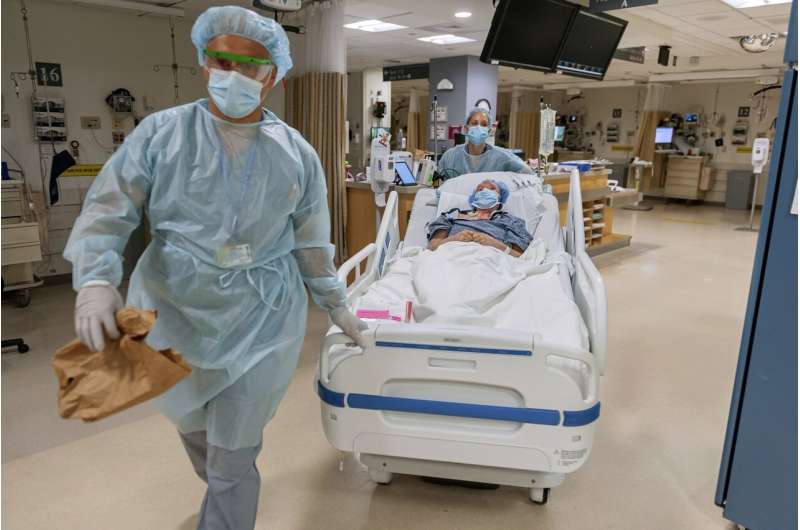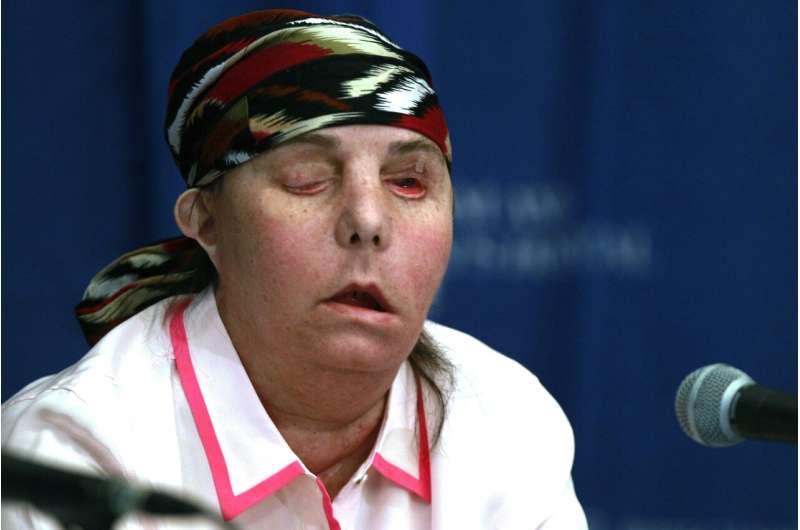Woman is 1st in US to get 2nd face transplant

For the second time in a decade, a New Hampshire woman has a new face.
Carmen Blandin Tarleton, whose face was disfigured in an attack by her ex-husband, became the first American and only the second person globally to undergo the procedure after her first transplant began to fail six years after the operation. The transplant from an anonymous donor took place at Boston's Brigham and Women's Hospital in July.
The 52-year-old former nurse is expected to resume her normal routine, which all but ended when the first transplant failed a year ago.
"I'm elated," Tarleton told The Associated Press, in an exclusive telephone interview from her home in Manchester. She is still healing from the operation so photos are not being made available of her new face.
"The pain I had is gone," she said. "It's a new chapter in my life. I've been waiting for almost a year. I'm really happy. It's what I needed. I got a great match."
More than 40 patients worldwide have received face transplants, including 16 in the United States. None of the American patients had lost their donor faces until Tarleton.
But in 2018, a French man whose immune system rejected his donor face eight years after his first transplant underwent a second. The doctor who did the transplant, Dr. Laurent Lantieri of the Georges Pompidou European Hospital in Paris, said that patient is "doing very well."
Dr. Bohdan Pomahac, who did Tarleton's first face transplant, was hesitant to do another and favored doing reconstruction surgery instead. But his team became convinced of the merits of a second transplant after Tarleton described how much the first one improved her life.
"She really wanted to try one more time," said Pomahac, who led the 20-hour, second surgery. A team of around 45 clinicians removed the failing transplant and then prepared sensory nerves and blood vessels in the neck for the surgical connection. The face was then transplanted and Tarleton will gain sensory and motor function in the coming months.
Unlike her first transplant, the donor this time around was considered a much better tissue match. Because of her previous injuries before the first transplant, 98% of donors were incompatible matches. Even then, the first face led to several cases of acute rejection, in which the body attacks the new face and strong drugs are needed to suppress the immune system.

"Now, I am very optimistic and hopeful that it will last a lot longer than the first transplant," said Pomahac, who has described the match as miraculous. "But, of course, that is wishful thinking, speculation. I don't know. She really got lucky."
Brian Gastman, a plastic surgeon at the Cleveland Clinic who led its last two face transplants, said Tarleton's case illustrates the limitations of these procedures.
"When you look at most organ transplants, there is a shelf life," Gastman said. "We are getting to the point where these face transplantations are hitting against the maximum number of years someone can have one in."
Tarleton was burned on over 80% of her body and blinded in 2007 when her estranged husband, Herbert Rodgers, beat her with a baseball bat and doused her body with lye because he thought she was seeing another man. In 2009, Rodgers pleaded guilty to maiming Tarleton in exchange for a prison sentence of at least 30 years. He died in prison in 2017.
The first transplant transformed Tarleton's life. She got off strong medications for her pain, took up the piano and was able to travel and give inspirational speeches—often talking of how she had forgiven Rodgers. She also became close friends with the daughter of her first donor, a 56-year-old woman who died of a stroke. She also got a synthetic cornea in her left eye.
But by last year, the face was failing. She began experiencing scarring, tightness and pain because of a loss of blood flow to her face. Black patches appeared on her face. Her eyelids contracted and her lips began disappearing, making it difficult to eat. She was mostly housebound and resumed taking strong pain medications.
"I couldn't do anything," she said. "I was pretty much in pain."
She requested in October to be put the hospital's list for a second face. That process took much longer, in part, because she was taken off the list for two months because of the coronavirus pandemic. She was added back on when the state allowed elective surgeries to resume.
Now that she has her new face, Tarleton is hoping to once again travel and give inspirational speeches—those will be on Zoom until there is a coronavirus vaccine. For now, she is still getting used to her new appearance.
"This face looks very different than my first one and I can appreciate that. It's a different person," she said, adding the new face allows her to "fit in a little better, don't get stared at so easily."
"It is strange. I am not going to lie," she added. "I'll have to get used to it. My sister will have to get used to it. It takes a while for my friends and family to get used to what I look like now."
© 2020 The Associated Press. All rights reserved. This material may not be published, broadcast, rewritten or redistributed without permission.



















